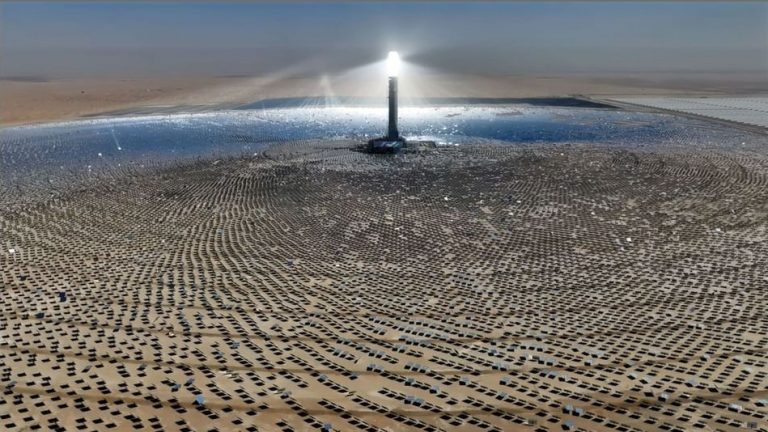
The past year saw the adoption of the “UAE Energy Strategy 2050”, aiming to achieve climate neutrality in the electricity and water sector by 2050
Abu Dhabi
The UAE celebrates the International Day of Clean Energy on January 26, 2024 (Today), highlighting its global leadership in the sector and launching initiatives to address climate change. This follows the conclusion of the Year of Sustainability 2023, showcasing the country’s role in advancing renewable energy.
The past year saw the adoption of the “UAE Energy Strategy 2050” by the Cabinet, aiming to achieve climate neutrality in the electricity and water sector by 2050. This involves reducing emissions, eliminating clean coal from the energy mix, and increasing consumption efficiency. Other goals include tripling the contribution of renewable energy by 2030, raising the total installed capacity of clean energy from 14.2 gigawatts to 19.8 gigawatts by 2030, increasing the contribution of installed capacity for clean energy from the total energy mix to 30% by 2030, and raising the contribution of clean energy generation to 32% by 2030 to stay on the right path to mitigate the impacts of climate change.
Also read: TeamLab Phenomena Abu Dhabi project 70% complete
In 2023, the National Hydrogen Strategy was launched, outlining steps to establish two hydrogen oases and study the potential for three future oases. This enhances the UAE’s position as a global producer and exporter of clean energy, boosts local production capabilities, accelerates the global hydrogen economy, stimulates the domestic market, promotes regulatory frameworks and policies supporting hydrogen as a fuel for the future, fosters regional cooperation, and increases investment in research and development. The strategy aims to create economic growth, generate thousands of jobs by 2050, and reduce emissions in high-emission sectors by up to 25% by 2031.
On the project level, the UAE witnessed, in November of last year, the inauguration of the Al Dhafra Solar Photovoltaic Power Plant, with a production capacity of 2 gigawatts, making it the world’s largest solar power station in a single location. The station, located 35 kilometers from Abu Dhabi, contributes to supplying electricity to approximately 200,000 homes and avoiding the emission of 2.4 million tons of carbon annually.

The station includes around 4 million dual-faced solar panels, an innovative technology that allows more efficient electricity production by capturing solar radiation through both the front and back faces of the solar panels.
In December of last year, the UAE launched the world’s largest concentrated solar power project as part of the fourth phase of the Mohammed bin Rashid Al Maktoum Solar Park in Dubai. The fourth phase, with a production capacity of 950 megawatts, is the largest investment project using three common technologies to produce clean energy, including a total of 600 megawatts of parabolic trough collectors, a 100-megawatt solar power tower, and 250 megawatts of photovoltaic solar panels. The investment in this project reaches AED15.78 billion under the Independent Power Producer model.
The project features the world’s tallest solar power tower at 263.126 meters and the largest thermal energy storage capacity of 5,907 megawatt/h, as recognized by Guinness World Records.
Internationally, the hosting of the United Nations Framework Convention on Climate Change (COP28) conference by the UAE marked a significant milestone in the global transition towards clean energy. The COP28 conference approved the historic “UAE Consensus,” which, for the first time, indicated a transition to a fuel-free energy system that does not mitigate its emissions, enabling the world to achieve climate neutrality by 2050.
The conference successfully adopted the Global Renewable Energy and Energy Efficiency Commitment, aiming to triple renewable energy production capacity to at least 11,000 gigawatts, double the annual energy efficiency increase rate to over 4% by 2030, and was supported by 130 countries.
Also read: UAE launches ‘We the UAE for Strategic Intelligence 2031’ platform with World Economic Forum
Throughout 2023, the UAE continued its commitment to supporting and empowering sister and friendly countries in the field of clean energy, aligning with its leading role in enhancing global efforts to address the impacts of climate change. In September of last year, the UAE announced a financing initiative worth AED 16.5 billion to enhance the capabilities of several African countries in the field of clean energy by establishing, developing, and operating a wide range of solar and wind energy programs and projects, among other clean energy solutions.
This initiative falls under the umbrella of the “Union 7,” a development program launched by the UAE during the Abu Dhabi Sustainability Week in 2022 with the support of the Ministry of Foreign Affairs. It aims to provide clean electricity to 100 million people across the African continent by 2035, adding further significance based on the number of beneficiaries.
In the same context, the Abu Dhabi Fund for Development, since 1974, continues its efforts to support renewable energy projects worldwide. Its contributions have financed over 75 strategic projects in various countries.
Also read: UAE’s National Library and Archives participates in Cairo International Book Fair
These strategic projects have had a positive impact, providing sustainable communities for the beneficiary countries. Their populations benefit from secure and reliable energy supplies, improving their quality of life and gaining access to a clean environment free from carbon emissions. Additionally, the beneficiary countries have succeeded in reducing their reliance on fossil fuels, creating thousands of job opportunities for their citizens, contributing positively to the development journey, and ensuring a more sustainable future for future generations.
Abu Dhabi Future Energy Company “Masdar” is one of the fastest-growing renewable energy companies globally, operating in over 40 countries across six continents. “Masdar” has expanded its portfolio of clean energy projects to reach a total production capacity of over 20 gigawatts, sufficient to power 5.25 million homes. These projects contribute significantly to reducing emissions by more than 30 million tons of carbon dioxide annually, equivalent to removing 6.5 million cars from the roads.
Published under the International Cooperation Protocol with Middle East Business
_____________________